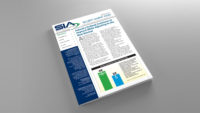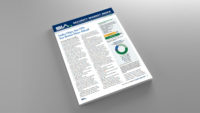
|
The showdown over U.S. debt and the continuing crisis surrounding the euro caused instability in a number of sectors, and that instability was reflected in the third quarter 2011 Security Industry Business Confidence Index, which is a report conducted by the Security Industry Association among its members who provide security products and services to the reseller channel of dealers and integrators.
Security industry CEOs and presidents surveyed reflected the growing concern over the possibility of a global recession, or a much slower recovery than was anticipated.
Compared with the second quarter of 2011, the Index dropped dramatically — down to 60.8 from 70.1 — and continues the trend of lower confidence across the industry throughout 2011. The third and fourth quarters of 2010 showed negligible change, from 74 in the third quarter of 2010 to 74.9 in the fourth quarter. Starting in the first quarter 2011, however, the Index dropped to 73.3 and has continued to decline. This drop in confidence coincides with troubling economic news in the U.S. and in Europe.
Despite the recent lower numbers, confidence is higher than it was for the same period in 2009, when it dropped below 50, and there is reason to believe confidence will improve in the fourth quarter Index and into 2012.
According to the third quarter 2011 Security Industry Business Confidence Index survey, 70 percent of respondents felt that current conditions were good to excellent. This is an improvement over the second quarter (68 percent), but down from a high of 80 percent in the 4th quarter of 2010.
Increased spending in the IT sector may be providing a cushion for the security systems segment of the industry. IT research firm Gartner recently raised its overall global IT spending forecast to 7.6 percent in 2011, which is 1.7 percent higher than in 2010. Gartner’s previous outlook called for IT spending growth of 7.1 percent for 2011. The outlook for 2012 is not as high, however, with projected overall IT spending at 4.9 percent.
The Conference Board Measure of CEO Confidence, which had risen in the first quarter of 2011, retreated sharply in the second quarter. The measure is now at 42 points, down from 55 points in the second quarter.
Lynn Franco, director of The Conference Board Consumer Research Center, said, “CEO confidence cooled considerably in the second quarter, a reflection of a sluggish U.S. economy. Looking ahead, expectations are that this slow pace of economic growth will continue.
“Regarding the outlook for profits over the next 12 months, the news was a bit more favorable, with about 70 percent of CEOs anticipating profit increases,” she added.
CEO assessments of current economic conditions were much more pessimistic than in the second quarter of 2011. Of CEOs surveyed, 11 percent said conditions are better compared to six months ago, which is down from 33 percent in the second quarter. In assessing their own industries, business leaders were also more negative, with only 40 percent saying conditions have improved — down from 61 percent in the first quarter of 2011.
CEO optimism about the short-term outlook also declined sharply in the third quarter of 2011. Only 19 percent foresee an improvement in economic conditions over the next six months, which is down from 43 percent in the second quarter. That pessimism was reflected in CEO expectations for their own industries, with just 22 percent of respondents saying they expect conditions to improve in the months ahead. This is down from 44 percent in the second quarter of 2011.






